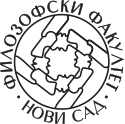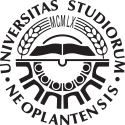15MM012 - Trends in Linguistics and Language Theory
| Course specification | ||||
|---|---|---|---|---|
| Course title | Trends in Linguistics and Language Theory | |||
| Acronym | 15MM012 | |||
| Study programme | Hungarian Language and Literature | |||
| Module | ||||
| Type of study | second degree master academic studies | |||
| Lecturer (for classes) | ||||
| Lecturer/Associate (for practice) | ||||
| Lecturer/Associate (for OTC) | ||||
| ESPB | 6.0 | Status | ||
| Condition | none | Oblik uslovljenosti | ||
| The goal | To give an overview of the most significant developments in linguistic theory and research in the 20th century and to demonstrate how the approach to language and its description has changed in this period. | |||
| The outcome | Students are aware of the changes and developments in linguistic theory; they understand how the approach to language and its description changed in the course of the 20th century; they are familiar with the contemporary scientific approach to linguistics. Students can analyze problems and synthesize sources and ideas to solve them; they understand recent developments in linguistics and can apply the theoretical knowledge gained in the course. | |||
| Contents | ||||
| Contents of lectures | 20th century linguistic theories. Ferdiand de Saussure's theory. The basic tenets of structuralism. The Prague linguistic circle. American descriptive linguistics. Formal grammars and methods of descriptive linguistics. Generative grammar. Principles and parameters theory, the Minimalist program. Lexicalist theories (Lexical-functional grammar, Head-driven phrase structure grammar). Contemporary linguistics: cognitive linguistics. | |||
| Contents of exercises | Reading and interpreting research papers in linguistics. Sentence analysis in the generative approach. | |||
| Literature | ||||
| ||||
| Number of hours per week during the semester/trimester/year | ||||
| Lectures | Exercises | OTC | Study and Research | Other classes |
| 2 | 1 | |||
| Methods of teaching | Lectures, class discussions, individual work and student presentations | |||
| Knowledge score (maximum points 100) | ||||
| Pre obligations | Points | Final exam | Points | |
| Activites during lectures | 5 | Test paper | ||
| Practical lessons | 5 | Oral examination | 60 | |
| Projects | 15 | |||
| Colloquia | ||||
| Seminars | 15 | |||

